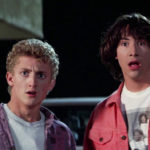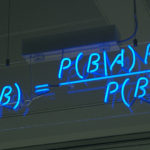Sean Carroll, Determinism, and Laplace’s Demon
by Brandon Vogt
Filed under Atheism, Christianity and Science, Cosmology

Today we continue our series looking at physicist Sean Carroll's new book, The Big Picture: On the Origins of Life, Meaning, and the Universe Itself (Dutton, 2016).
After exploring whether the universe needed a cause to get started, Carroll next turns to the topic of determinism: is reality determined or free?
Laplace's Demon
Carroll's answer relies on a famous thought-experiment involving "Laplace's Demon". Pierre-Simon Laplace was an accomplished French physicist and mathematician. He's also, according to Carroll, one of the fathers of determinism, which holds that all future states are inevitable consequences of past events and causes. Laplace proposed a hypothetical vast intellect (aka "Laplace's Demon") who has an omniscient grasp of reality. In today's scientific language, the Demon would know the positions and velocities of all the particles in the universe, understand all the forces they are subject to, and have sufficient computational power to apply the laws of motion. The Demon would then be able to determine any future event by simply analyzing the state of the universe right now. Or as Carroll says, "Laplace was pointing out that the universe is something like a computer"—current state in, future state out.
Now, Carroll admits that for all practical purposes, Laplace's Demon is not real. He's just a useful thought experiment. Such a Demon will never exist in the real world since there's simply too much information to account for. We will never invent a computer that can ascertain the state of every particle and force at every moment in time. To do so, Carroll admits, would require God-like programming (which he immediately dismisses, uncomfortable with any conclusion that may result in God.) So we will never be able to tell the future with complete certainty, ala Laplace's Demon.
But that's not what Carroll's primarily interested in. He doesn't aim to show that physics can ascertain the future; he's just interested showing that physics can determine the future.
That leads to a natural question: why do we think this is true? Even if a Demon or a computer had complete knowledge of the state of the universe, why should we assume such prior states determine what happens next? Carroll never explains. He simply presumes causal determinism without proving it.
(Careful readers will note that in the previous chapter, Carroll aims to show that causality is not a feature of fundamental reality. But here he aims to prove causal determinism, that prior states cause future states. Carroll either doesn't notice or doesn't worry about the apparent contradiction.)
Later in the book, in a different chapter, Carroll gestures toward a supporting argument for determinism. He writes:
"The Laplacian view...is based on patterns, not on natures and purposes. If this certain thing happens, we know this other thing will necessarily follow thereafter, with the sequence described by the laws of physics. Why is it this way? Because that's the pattern we observe."
This again raises many questions. For instance, why think patterns are mutually exclusive of natures and purposes? Again, Carroll just asserts this without evidence. Why can't things follow patterns given by their nature?
Also, why do things in the world follow these specific patterns and laws, and not others? It's not enough to say, "Because those are the patterns we observe." That just avoids the question. It's equivalent to saying, "Nature follows the patterns we observe because those are the patterns we observe," or to put it more simply, "That's just the way it is," an answer that may satisfy Bruce Hornsby but not the truly curious skeptic.
Still, the biggest problem with Carroll's Laplacian defense of determinism was already preempted by David Hume. The Scottish skeptic affirmed what stock brokers remind us of today, that past performance is no guarantee of future results. The fact that past events usually or even always occur in some pattern doesn't mean future events have to occur that way.
For example, suppose that from birth to age 30, I ate a vanilla ice cream cone at exactly 2:00pm, every single day. So when my 31st birthday party rolled around, you glance at the clock and see it's 1:59pm, and you're nearly certain what will happen next. After all, that's the pattern you've always observed, me eating ice cream at 2:00pm, not just once or twice, but repeatedly and without exception for thirty years. As the hour chime hits, you see me scoop ice cream into a cone, lift the cone to my mouth....and then I stop. I strangely put the cone down and decide not to have any today.
Now, if you suggested I was determined to eat ice cream on my 31st birthday since "that's the pattern [you] observed" (to use Carroll's language), you would have been wrong. Thus determinism can't be solely grounded in the knowledge of past patterns.
But suppose the determinist replied, "Ah! But maybe you were determined to eat ice cream every day for thirty years and then determined to stop eating it on your 31st birthday!" Perhaps. But how would we know it? What arguments or evidence could we offer to support that proposal? Carroll says we know events are determined "because that's the pattern we observed." But in this case, it's precisely not the pattern we observed. Assuming it would be a new determined pattern that was previously unobservable would only beg the question in favor of determinism and make it unfalsifiable.
Determinism, Destiny, and Fate
Bad arguments aside, Carroll's not wholly comfortable with the implications of determinism. Therefore, he tries to soften its blow by distinguishing it from destiny and fate (emphasis mine):
"The physical notion of determinism is different from destiny or fate in a subtle but crucial way: because Laplace's Demon doesn't actually exist, the future may be determined by the present, but literally nobody knows what it will be." (36)
This reveals a confusion. Carroll implies that since we can't know the future, determinism doesn't imply fate or destiny. But our knowledge of the future is irrelevant to the question of whether we're fated or free. Determinism indeed implies fate since perfect knowledge of the current moment yields perfect knowledge of the next, and so on and so forth, ad infinitum. That means every future moment is already set based on the state of the world right now (which is, in turn, based on the states before it). On determinism, your entire future is unavoidably fated.
Carroll tries another route to sidestep determinism's dreary implications, this time returning to his poetic naturalism:
"There is one way of talking about the universe that describes it as elementary particles or quantum states, in which Laplace holds sway and what happens next depends only on the state of the system right now. There is also another way of talking about it, where we zoom out a bit and introduce categories like 'people' and 'choices'...Our best theories of human behavior are not deterministic. We don't know any way to predict what a person will do based on what we can readily observe about their current state. Whether we think of human behavior as determined depends on what we know."
Here, again, we spot the confusion. Carroll seems to think determinism means you can predict future states of events—to the degree you can predict them, they're determined. But determinism is independent of what we know or predict. If reality was completely determined, that would remain true whether we predicted some, all, or no future events.
Also, Carroll affirms that while fundamental reality (i.e, level one reality, the deepest, quantum level of the universe) is deterministic, the higher levels (i.e., "emergent" levels) are not necessarily deterministic. In fact, they seem to be quite the opposite. Yet how can this be so? If elementary particles and quantum states are determined, then categories like "choice" would be, at best, useful fictions. They may help us get along in the everyday world, but they're ultimately out of step with fundamental reality. Once again, we see another example of Carroll's instrumentalism, preferring "stories" that work rather than explanations that are true.
The Final Blow Against Determinism
In the end, Carroll offers no convincing reasons to think determinism is true. Yet even if Carroll thought it was true, why would he try to persuade us of it? If determinism was true, then we've been pre-determined to either accept or reject it—we have no choice in the matter! And so we arrive at the final knockout blow against determinism: anyone trying to convince people determinism is true, to convince them to freely change their mind about determinism, implicitly undermines it.
In the next post, we'll looks at Carroll's thoughts about the philosophy of time. Stay tuned!
Related Posts
Note: Our goal is to cultivate serious and respectful dialogue. While it's OK to disagree—even encouraged!—any snarky, offensive, or off-topic comments will be deleted. Before commenting please read the Commenting Rules and Tips. If you're having trouble commenting, read the Commenting Instructions.












